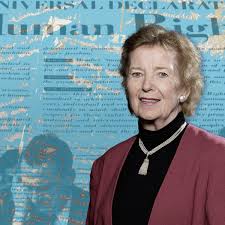Mary Robinson: A Leader in Climate Justice and Human Rights

Introduction
Mary Robinson, the first female President of Ireland and former UN High Commissioner for Human Rights, has emerged as a prominent voice in the fight against climate change. Her advocacy for climate justice highlights the intersectionality of environmental challenges and human rights, making her work increasingly relevant in today’s world, where the effects of climate change are becoming more pronounced. As nations grapple with the urgent need for action, Robinson’s insights and leadership serve as a guiding light in the quest for sustainability and equity.
Mary Robinson’s Contributions to Climate Justice
In 2010, Robinson founded the Mary Robinson Foundation – Climate Justice, an organisation dedicated to addressing the effects of climate change through a human rights lens. This groundbreaking approach emphasizes that climate change disproportionately affects the world’s most vulnerable populations, and thus, equity must be a fundamental component of climate action. Her work focuses on creating a global movement that uplifts the voices of those most impacted, ensuring that their needs and rights are prioritized in policy discussions.
Recent Activities and Speaking Engagements
Robinson has been active in various international forums, most notably at the United Nations Climate Change Conference (COP). Her speeches often resonate with urgency, calling for immediate and bold actions to mitigate climate change impacts. Recently, she participated in COP27, where she urged leaders to recognise climate change as a stark threat to human rights and called for collaborative efforts to achieve net-zero emissions. Robinson’s commitment to justice extends to addressing issues like climate migration and adaptation strategies for developing countries, showcasing her holistic approach to climate issues.
Recognition and Legacy
Robinson’s relentless work has garnered her numerous accolades, including honorary degrees and international awards recognizing her contributions to human rights and environmental advocacy. As a member of the Elders—a group of distinguished global leaders formed by Nelson Mandela—she continues to influence policies on climate and human rights worldwide. Her legacy is not just in the policies she advocates for but also in her ability to inspire a new generation of activists and leaders to take up the mantle for justice.
Conclusion
Mary Robinson’s pivotal role in promoting climate justice cannot be overstated. With the planet facing unprecedented environmental challenges, her advocacy efforts remind us that true sustainability must include a focus on equity and human rights. As we look to the future, Robinson’s work will undoubtedly contribute to shaping a more equitable world, where both people and the planet can thrive. Her vision impels us all to recognise the urgent need for collective action against climate change, making her a significant figure in global discussions moving forward.
